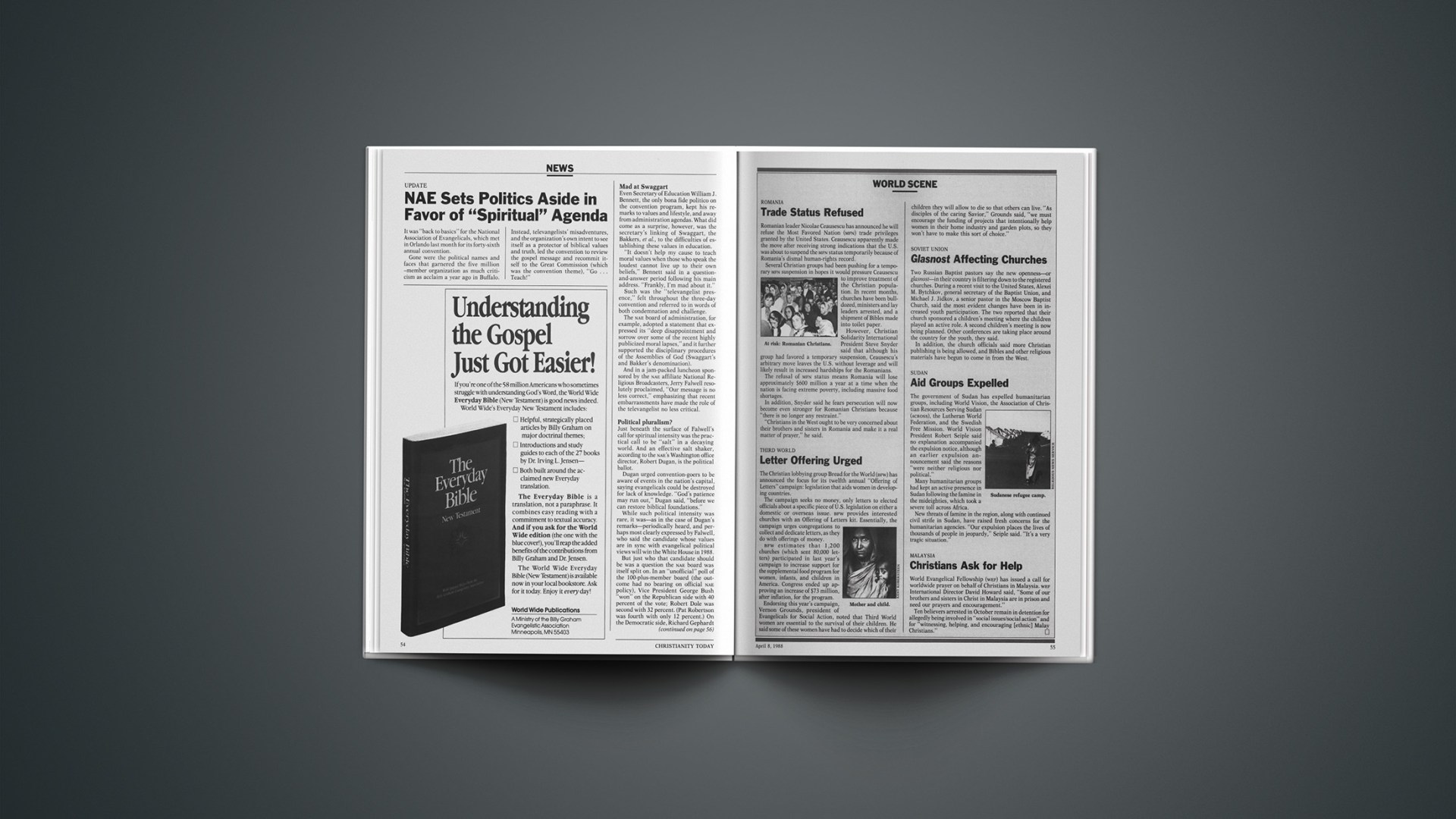It was “back to basics” for the National Association of Evangelicals, which met in Orlando last month for its forty-sixth annual convention.
Gone were the political names and faces that garnered the five million-member organization as much criticism as acclaim a year ago in Buffalo. Instead, televangelists’ misadventures, and the organization’s own intent to see itself as a protector of biblical values and truth, led the convention to review the gospel message and recommit itself to the Great Commission (which was the convention theme), “Go … Teach!”
Mad At Swaggart
Even Secretary of Education William J. Bennett, the only bona fide politico on the convention program, kept his remarks to values and lifestyle, and away from administration agendas. What did come as a surprise, however, was the secretary’s linking of Swaggart, the Bakkers, et al., to the difficulties of establishing these values in education.
“It doesn’t help my cause to teach moral values when those who speak the loudest cannot live up to their own beliefs,” Bennett said in a question-and-answer period following his main address. “Frankly, I’m mad about it.”
Such was the “televangelist presence,” felt throughout the three-day convention and referred to in words of both condemnation and challenge.
The NAE board of administration, for example, adopted a statement that expressed its “deep disappointment and sorrow over some of the recent highly publicized moral lapses,” and it further supported the disciplinary procedures of the Assemblies of God (Swaggart’s and Bakker’s denomination).
And in a jam-packed luncheon sponsored by the NAE affiliate National Religious Broadcasters, Jerry Falwell resolutely proclaimed, “Our message is no less correct,” emphasizing that recent embarrassments have made the role of the televangelist no less critical.
Political Pluralism?
Just beneath the surface of Falwell’s call for spiritual intensity was the practical call to be “salt” in a decaying world. And an effective salt shaker, according to the NAE’S Washington office director, Robert Dugan, is the political ballot.
Dugan urged convention-goers to be aware of events in the nation’s capital, saying evangelicals could be destroyed for lack of knowledge. “God’s patience may run out,” Dugan said, “before we can restore biblical foundations.”
While such political intensity was rare, it was—as in the case of Dugan’s remarks—periodically heard, and perhaps most clearly expressed by Falwell, who said the candidate whose values are in sync with evangelical political views will win the White House in 1988.
But just who that candidate should be was a question the NAE board was itself split on. In an “unofficial” poll of the 100-plus-member board (the outcome had no bearing on official NAE policy), Vice President George Bush “won” on the Republican side with 40 percent of the vote; Robert Dole was second with 32 percent. (Pat Robertson was fourth with only 12 percent.) On the Democratic side, Richard Gephardt polled 37 percent of the board vote, while Tennessee Senator Albert Gore was second with 33 percent. Democratic front-runner Michael Dukakis was third with 16 percent of the vote.
Thus the so-called evangelical voting bloc—while definitely Republican in bias—appeared to be anything but a consensus, and thus NAE’S persistence over the years in defining the role of evangelicals in more than political terms. And thus this year’s convention emphasis on evangelism, discipleship, compassion, and love.
“Forgive us,” Falwell said, referring to the past year’s media-personality immoralities. “We need to be more abandoned to his perfect will.”
By Harold Smith in Orlando.










